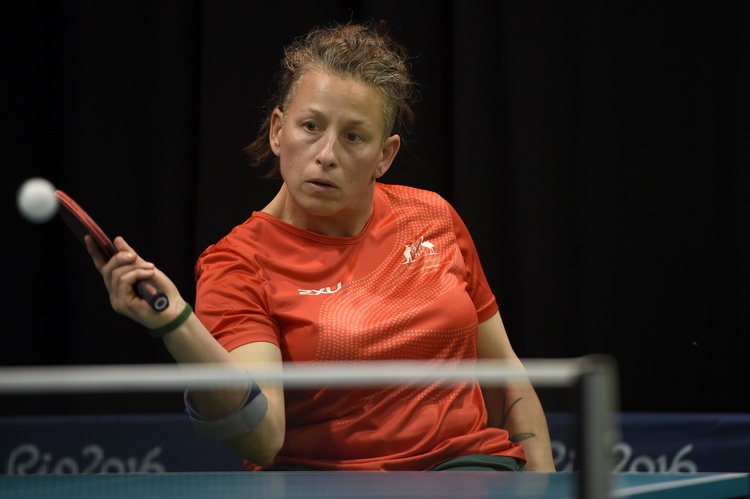Australia placed fifth on the overall medal tally collecting 81 medals, including 22 gold, 30 silver and 29 bronze.
While wheelchair tennis legend and six-time Paralympian, Daniela Di Toro didn’t take home a medal from this year’s games, her contribution to Australia’s success extended far beyond her physical performance.
Flanked by wheelchair racer Kurt Fearnley, Danni acted as co-captain of the Australian team, providing the ultimate support and guidance to athletes across all fields to get them across the line.
“It was one of the greatest experiences of my whole athlete life; proud doesn’t even begin to describe it,” Danni says.
“I feel like being able to be present to so many of those athletes doing incredible things every single day was so much more rewarding than any medal that I’ve ever won.”
Danni puts her role as co-captain at Rio right up there with competing at what she describes as the “Holy Grail”, otherwise known as Wimbledon.
But it wasn’t just her captaincy which defined Rio for Danni.
After dominating the world of wheelchair tennis for almost three decades, the two-time Paralympic medallist, 2010 French Open doubles champion, two-time US Open champion and former singles world number one was ready to take on a new challenge at Rio.
“I’d spent 27 years playing wheelchair tennis and I felt that as a tennis player I’d done pretty much everything there was to do,” Danni says.
So, in a unique move, Danni exchanged a racket for a bat and a court for a table.
Danni’s decision to switch to table tennis stemmed from a difficult period around the 2012 London Games.
After sustaining a serious injury, Danni was forced out of action for almost a year, while it took around two years for her body to fully recover.
“While I was trying to not go insane I just started playing table tennis for a bit of fun,” Danni says.
“It was a really fun way to get out of the house in a competitive space that was enjoyable and wasn’t putting too much pressure on my body.”
What started out as a fun way to pass the time soon flourished into an opportunity to burst back into the international sporting arena.
When Danni was invited to play at the Oceania Games, the wildcard to Rio, she accepted the offer just to help fill a draw.
But Danni certainly did more than fill a spot; she won and was presented the opportunity to play at Rio.
“Things moved really quickly and I wouldn’t necessarily say it was expected, but those couple of injuries I had reminded me of how important it is to say yes to things,” the athlete explains.
Danni is one of those individuals that just ooze positivity, and Rio isn’t the first occasion that this sporting superstar has turned a tough time into an opportunity for greatness.
At 13 years old, Danni was attending a school swimming carnival when a wall collapsed on her, severing her spinal cord.
Just six months after her injury, Danni was taking on her first wheelchair tennis tournament, rocking up to compete in her everyday wheelchair like it was no big deal.
“It was completely insane and yet it was just a very natural, obvious thing to do,” Danni says.
Back in 1988, national tournaments were more integrated, and every sport under the sun was hosted at the one venue, providing an eye-opening experience for a young Danni.
“I was able to watch and interact with athletes from other sports and just got a real appreciation for what the disabled sporting community looks like and how amazing it is,” she says.
“I remember watching the number one Australian female at the time and I was just a total punk who thought ‘I could totally beat her!’”
Less than a year later at the Australian Open, Danni did just that and became the new Australian number one while climbing to number 10 in the world.
While Danni was already an avid tennis player before her accident, never in her wildest dreams did she imagine that she’d grow up to become a professional athlete and sporting legend.
“All I wanted to do ever since I can remember was be a surgeon,” Danni says.
“That’s why sport’s such an incredible vehicle; it’s about pushing yourself and having these experiences that you wouldn’t necessarily have, and certainly for people with disabilities that creates a whole world of independence.”
While Danni may not have grown up to be a surgeon as she’d once dreamed, she did keep with the healing theme, and became a Chinese medicine practitioner instead.
Danni’s passion for Chinese medicine dates back to when she was recovering from her injury and trying to process that life-changing event which she faced at 13 years old.
“I come from a very Italian family and I love how passionate my family is, but grief and all of those things are very big emotions as well,” Danni says.
“When I was in hospital I realised how important it is to have a really positive mind and what I did see, even at that age, was that lots of people in a similar situation were dealing with it in a really angry way, or a very grief-stricken way like my family, and I felt like neither of those things were particularly useful.”
This realisation steered Danni down a path of self-discovery, and she developed a passion for Eastern philosophy based around Buddhism and Daoism.
When Danni looked to retire from tennis in 2004, her interest in Eastern thought took on a new meaning.
“I was looking for a challenge and something that really interests me that I could do for the rest of my life, so I enrolled in my Chinese medicine degree,” Danni says.
Since becoming a qualified Chinese medicine practitioner, Danni has managed to juggle both her profession and her sporting commitments in an impressive balancing act.
“That’s definitely a balance that most athletes in Australia have, and I think that’s probably one of the misconceptions,” Danni says.
“Most of our Paralympic athletes are studying or working full-time and then trying to be an athlete full-time...it’s pretty intense.”
And it would appear that this incredible balance won’t be over any time soon for Danni.
After having battled it out against two top five table tennis players at Rio, despite having only been in the sport for just over a year, Danni was inspired to improve and reach their heights.
“I want to be competitive and I want to be able to match them a little bit,” Danni says.
“It’s nice to have that feeling of wanting to be better at something, and every day I aim for that.”
While Danni is still fresh from Rio, she’s already got her sights set on her next endeavour.
“I’m looking at working towards Tokyo if that’s something that works out for me that would be amazing,” she says.
Danni might as well book her flights now, because with all the ambition and courage in the world, there’s no doubt that she’ll be back and better than ever in four years time.












